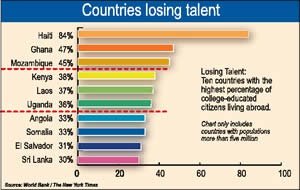... 47% College Graduates Live Abroad
... symptom of deep economic, social problems in Ghana?
... middle-class workers living abroad can help
Ghana has been ranked second among the countries, with a population of over 5 million, most hit by brain drain.
A World Bank study on census and population published on Monday in a book titled ?international Migration, remittances and Brain Drain,? says 47% of Ghana?s college-educated citizens were living abroad.
?For a country with about half of its graduates missing, one has to worry,? says a director of the World Bank?s development research group.
?The exodus of skilled workers is a symptom of deep economic, social and political problems in their homelands and can prove particularly crippling in much needed professions in health care and education,? the report says.
Among the 10 most crippled [population over 5 million], Ghana is second, with Haiti leading at 84%, Mozambique 45%, Kenya 38%, Laos 37%, Angola 33%, Uganda 37%, Somalia 33%, El-Salvador 31% and Sri-Lanka 30%.
According to the report, which traced the massive exodus of professionals from some of the world?s most vulnerable low- income countries, poor countries across Africa, Central America and the Caribbean are losing sometimes staggering portions of their college-educated workers to wealthy democracies.
In an extensive survey of data from 30 OECD countries such as the US, UK, Canada and Australia (rich nations under the head Organization for Economic Cooperation and Development), the study estimates that 25% to 50% of college educated citizens of poor countries like Ghana, Mozambique, Kenya, Uganda and El Salvador lived abroad in an OECD country. This goes up to more than 80% for Haiti and Jamaica.
In contrast, large developing countries such as China, Brazil, India and Indonesia have lost less than 5% of their skilled citizens to OECD. Moreover, the recent return traffic is bringing back intellectual and financial resources to these countries
The study said the middle-class workers living abroad could get their countries out of poverty.
?These patterns suggest that an extensive flight of educated people is damaging many small to medium-size poor countries,? says Frederic Docquier, a lead researcher for the bank, and an economist at the University of Leuven, Belgium.
The study says although remittances and investiments back home reduced poverty and were a major source of foreign exchange, the broader implications were ?complex?.
Editors of the report say policies may be needed to raise incomes of professionals in their countries.
It said immigrants were an indication that their countries were badly run economically.
It says some scholars believe that brain drain may also fuel the vicious cycle of underdevelopment and cost poor countries the people with the ability to resist corruption and bad governance.
The report said the loss of institution builders, hospital managers, university department heads and political reformers could trap countries in poverty.

















